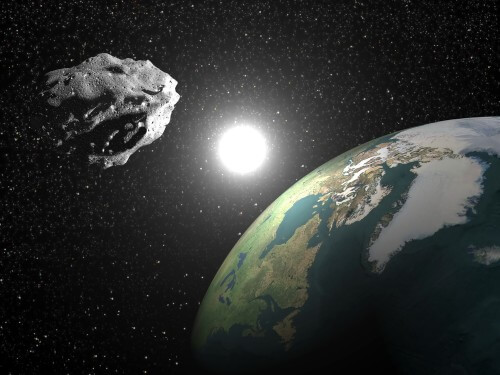If such an asteroid were to collide with the Earth it could cause enormous damage, large fragments would fly into the atmosphere and the side effects as a result of the fall may change the Earth's climate and make the planet uninhabitable. The impact of smaller objects can destroy cities. But such events are rare

Update 27/3/15 time 15:00 - The asteroid passed as expected at a safe distance from Earth, this morning at 09:20 Israel time.
Coincidentally, NASA announced that Drag a rock from the face of a near-Earth asteroid into lunar orbit where astronauts can study it
Important note: Because the tabloids copied from the British Daily Express and other websites where no one understands science made an irresponsible statement that a kilometer-sized asteroid would hit the Earth. I wanted to make it clear to you that There is no chance that it will hit - it will pass at a distance 10 times that of the moon, and b. If he was going to offend, it would no longer be written only in the tabloids, but in all the media in the world. And it was also the last news that will be published in them. see also "The end of the world is coming" By Itamar BZ on the Seventh Eye website
An asteroid with a diameter of about 500 meters to a kilometer will pass on Friday (27/3/15) at 09:20 Israel time relatively close to the Earth. Asteroid 2014-YB35 moves in space at a speed of about 37 thousand km/h, however according to the reports of NASA's Near-Earth Self-Tracking Program the closest point to the Earth will be at a distance of 4.5 million kilometers, more than 10 times the distance from the Earth to the Moon (more precisely 11.7 times) This distance is completely safe.
The asteroid was first discovered at the end of 2014 by the Catalina Observatory.
If such an asteroid were to collide with the Earth it could cause enormous damage, large fragments would fly into the atmosphere and the side effects as a result of the fall may change the Earth's climate and make the planet uninhabitable. The impact of smaller objects can destroy cities. But such events are rare.
This approach will not be the closest in 2015. A much smaller asteroid known as '2004-BL86' passed within about 1.2 million km of Earth in January.
NASA has been watching 2014-YB35 since it was discovered. About 380 views were made on it. According to the agency, the asteroid's next visit will be in 2033. On that approach, it will come a little closer than the current approach, but there is still no risk of impact.
How can you identify an asteroid that is about to hit the Earth and is it possible to defend against it?
Haim Barak from the Department of Particle Physics and Astrophysics at the Weizmann Institute Writing on the Davidson Online website:
"The chances of an asteroid hitting the Earth are small but still possible. Our solar system is very large compared to the earth, which means that the chances of an object in the solar system hitting the earth are small. Occasionally this does happen, but it is not common."
"An asteroid with a diameter exceeding a kilometer hits the Earth once every 100,000 years on average. If astronomers find an asteroid moving towards us, we will have a lot of time to track it, measure its trajectory with great precision and design a system that can divert it from its path. It is important to emphasize that if indeed an asteroid is discovered by astronomers from the space agency NASA, there will be no need to rush and panic because we will have plenty of time to plan how to deflect it, a period of time that can reach several decades. Obviously, if we do detect an asteroid moving towards us, it will be a worldwide project."
"The very fact that we can detect such an asteroid at a great distance from the earth, its small deviation is enough to change its trajectory. The diversion can be by a missile or a spacecraft that will be transported towards it."
"The space agencies track asteroids that are larger than 1 km in diameter, a size that indeed constitutes a global ecological risk if such an asteroid hits Israel. But there are also much smaller asteroids that have a chance of actually hitting Earth with energy equivalent to a large nuclear bomb, sometime in the next few centuries. Such an impact occurred in 1908 in the Siberian region with an estimated energy of 15 megatons. The risk that could be caused to us by an asteroid impact like the one that occurred in 1908 is small. A risk that cannot exceed the risk of large earthquakes or large storms. In 2003, NASA conducted an assessment regarding asteroids whose diameter does not exceed a kilometer and came to the conclusion that a program to locate such 'small' asteroids is technologically possible and in general effective in terms of cost."
Details about the asteroid on the NASA website
More of the topic in Hayadan:

5 תגובות
Asteroid impact or another 4 years with Bibi (or two years a year) I think I'll go for the asteroid
I did not understand 9 in the morning or in the evening
Let us know after it happens so we can be calm?
We won't have a few decades to undo it because a devil's dance will begin here.
Thank you for the clarification,
I really did not understand why all the information comes from Facebook and there is no mention in YNET.
Strange, I thought he was a tabloid...
Google sent me here immediately